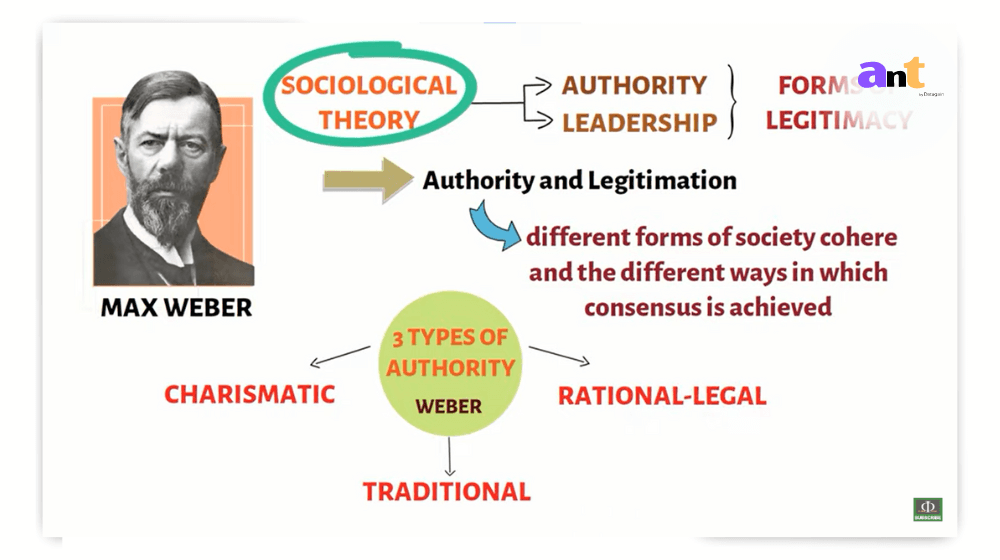
Home » Transcript Library » Sociology » Max Weber’s Sociological Theory: Key Concepts Transcript
Max Weber’s Sociological Theory: Key Concepts Transcript
00:00:02
Max Weber’s Sociological Theory, key concepts. At the center of Max Weber’s sociological theory is the concept of authority or leadership. And in Max Weber’s Sociological theory, authority or leadership is based on forms of legitimacy. Hence, for Weber authority and legitimation illustrate the ways in which different forms of society cohere and the different ways in which consensus is achieved. There are three types of authority according to Weber, namely charismatic, traditional rational, legal. Charismatic authority is an individualistic type of authority which is based on the rule of some great figure or personality such as a prophet, warrior or political demagogue. For Weber, charisma relies on the acceptance of the extraordinary and exceptional power of the leader. And according to Weber, legitimacy of the charismatic leader is based on the trust of the followers or the faith of the believers.
00:01:09
Traditional authority is also based on the role of a dominant personality such as a monarch or patriarch. However, traditional authority differs from charismatic authority in that the position of this kind of authority is dependent on established order. Thus, traditional authority is legitimated by an established tradition and that consensus is based on what has always been that is the everyday routine as a norm of conduct. Rational legal authority is a type of authority which is based on rules, not rulers. And obedience is not owed to a specific person but to the order. Here, authority is established through general rules, regulations and procedures. According to Weber, consensus here has rational grounds and legitimacy is based on the general belief in the formal correctness of such rules and those who enact them are considered legitimate authority. It is important to note that for Weber, legal rationality is absolutely necessary in modern societies as modern societies are becoming more and more complex.
00:02:18
In fact, Weber describes the movement of modern society as movement toward rationalization. And thus, bureaucracy becomes the main force within legal rational society. Legal rationality is also accompanied by the growth of industrialization, the development of the nation state and the modernization of society. In addition to the three types of authority just mentioned, let me briefly explain other key concepts of Weber’s sociological theory, namely authority as domination, the problem of bureaucracy and Weber solution, rationalization, modernity and capitalism, capitalism and the protestant ethic and rationalization and disenchantment of the world. On authority as domination, it is important to note that Weber views authority as domination. In fact, as Weber says, domination is a legitimate authority. Thus, Weber defines domination as the exercise of authority. And so as Weber further says, all domination involves administration and every administration is domination.
00:03:28
If all administration is domination and if the system always involves administration, then as Weber would have us believe nobody escapes domination. This is the reason why critics of Weber labeled him as a pessimist. On the problem of bureaucracy and Weber solution, according to Weber, the trouble with legal rational societies with highly centralized bureaucracy is that it had neither the institutions nor the level of consciousness capable of providing political leadership and direction. Weber’s solution to this problem lies with cultivating dynamic and charismatic personalities who are capable of coming forward as political leaders and who will accept responsibility on the people’s behalf. Thus, for Weber, political charisma is seen as the only hope of challenging bureaucratic dominance.
00:04:21
On rationalization, modernity and capitalism. Whereas for Marx, the main historical driving force is the mode of production for Weber. It is the process of rationalization. In fact, Weber regarded modernity as the relentless rationalization of all aspects of society. This rationalization, Weber argues results in the spread of instrumental reason or means and calculation which becomes the dominant ethos in modern societies and eventually dominates the spheres of government markets, education, law, political parties, trade unions and property. Weber argues that the development of legal rational society goes hand in hand with the development of capitalism. For Weber capitalism is based on instrumental reason that is instrumental rationality of formal rules, procedures and calculated acts. In other words, capitalism is based on means and rationality.
00:05:22
Now, according to Weber, modern capitalist societies require a certain type of personality best suited to purpose of rational action or means and rationality. According to Weber, this personality is based on bourgeois values and a capitalist spirit. This explains why Weber argues that the purpose of rational conduct of capitalism is best served by the religious values of protestantism. In fact, in his seminal work titled the Protestant Ethic and the spirit of capitalism, Weber looks at why capitalism developed most successfully in the countries in Northern Europe and North America. For Weber, then in the countries in Northern Europe and North America, the values and beliefs of the Protestant religion are most conducive to capitalist accumulation.
00:06:11
On capitalism and the Protestant ethic. According to Weber, protestantism best fits with the spirit of rational economic conduct as it provides an ethical justification for the activities responsible for money making. This is because as Weber contends the Protestant ethic is based on puritan aestheticism or the belief that self denial and self control are the best guarantees of salvation. Protestant ethic also bases itself on the view that it is through everyday worldly activity that we show our devotion to God. According to Weber, this necessarily leads to the adoption of a rational and active world view, which emphasizes the importance of hard work, frugality and individual responsibility and the aim to achieve economic success. This in turn, as Weber argues legitimates profit making accumulation, economic specialization and other activities crucial to the development of capitalist economy.
00:07:13
On rationalization and disenchantment of the world. It is important to note that in Max Weber’s Sociological theory, the direct product of rationalization is the disenchantment of the world. Disenchantment denotes demystification and secularization of the world which elevates science and technology to a new level of importance. For Weber, therefore, the paradoxical result of rationalization is that religion is relegated into the periphery. In other words, religion lost its relevance in modern societies that promote rationalization. This leads to the ultimate problem of rationalization that is as Weber sees it, humanity has been imprisoned in an iron cage of its own creation. What is then the alternative to the problem of rationalization? Although Weber argues that there is no escape from this iron cage. Again, as already mentioned, Weber hopes for the coming of a dynamic and charismatic personality who is capable of coming forward as a political leader and who will accept responsibility on the people’s behalf.
Copyright Disclaimer
Under Title 17 U.S.C. Section 107, allowance is made for “fair use” for purposes such as criticism, comment, news reporting, teaching, scholarship, and research. Fair use is permitted by copyright statute that might otherwise be infringing.






